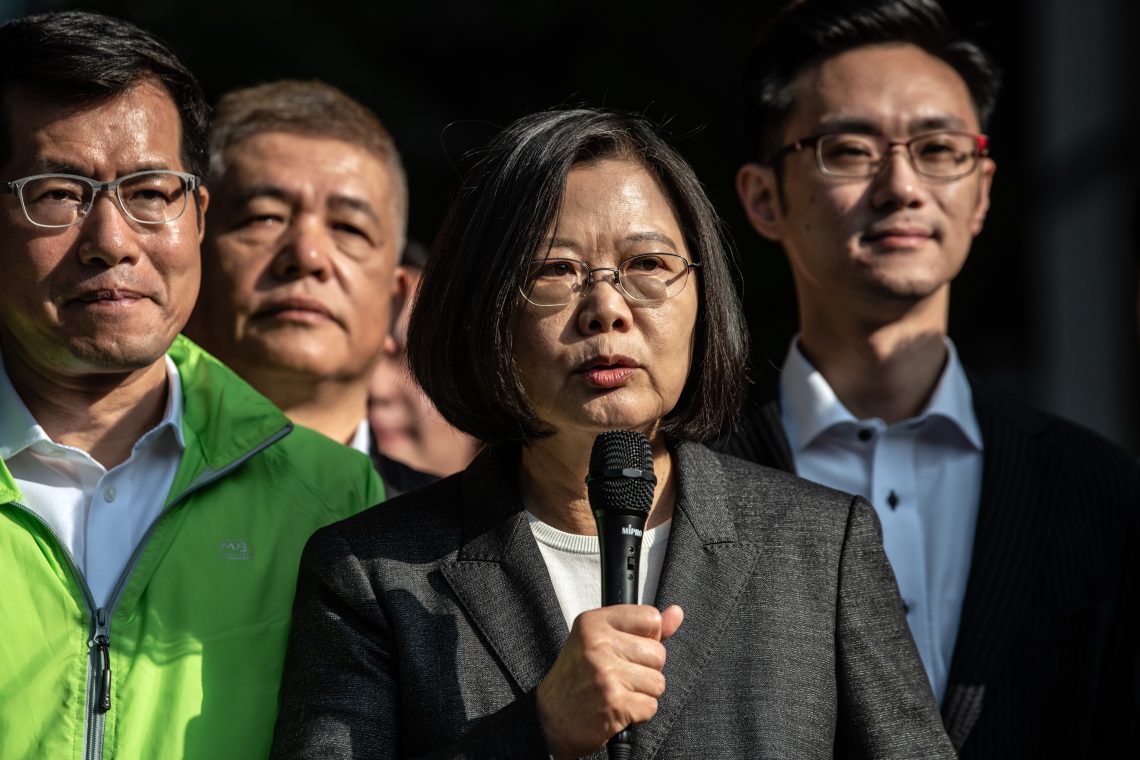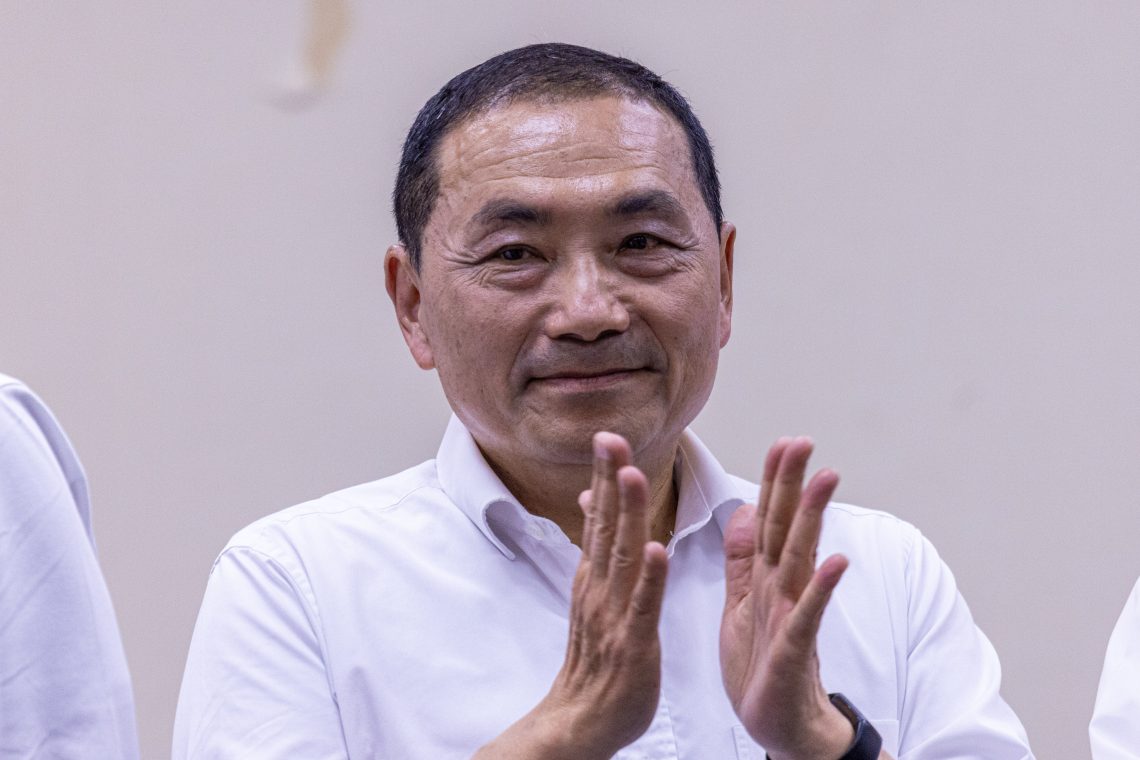Taiwan’s presidential election will shape cross-strait dynamics
Taipei’s perilously strained relations with Beijing make the island nation’s next presidential contest particularly charged domestically and internationally.

In a nutshell
- Taiwan is groping for a constructive and safe China policy
- Its presidential candidates have different strategies for preserving peace
- Beijing’s approach will depend largely on who is elected to lead Taiwan
In January 2024, Taiwan will hold one of the most consequential elections in its history. Incumbent President Tsai Ing-wen of the Democratic Progressive Party (DPP) has served two terms and is constitutionally barred from seeking reelection. Whoever succeeds her will play a pivotal role in shaping the island’s relations with China, which are currently at their tensest point in decades, with ramifications for U.S.-China friction and the Indo-Pacific security environment.
Escalating cross-strait tension
In recent years, the Taiwan Strait has reemerged as a dangerous military flash point following an unprecedented period of calm and cooperation under President Tsai’s predecessor Ma Ying-jeou of the Kuomintang (KMT) party. Though President Tsai has retained many elements of Mr. Ma’s moderate China policy and resisted pressure from radical party members to take a harder line, Beijing distrusts her and the nominally pro-independence DPP. Since she became president in 2016, Beijing has implemented the most aggressive campaign of military provocations, economic bullying, and diplomatic isolation in decades. These actions seek to deter Taipei and Washington, which Beijing fears will attempt to change the status quo in favor of legal Taiwan independence, and discredit the DPP’s leadership in hopes that voters will elect a leader more to China’s liking.
The goal of each of Taiwan’s mainstream political parties is nearly identical – to preserve Taiwan’s de-facto independence.
The opposition KMT also rejects unification under Beijing’s terms. However, its history as a Chinese party and its acceptance of the so-called “1992 Consensus” – a formulation developed by the KMT and Chinese Communist Party (CCP) by which the two sides acknowledge there is one China but maintain their differing interpretations of what that means – gives Beijing confidence that it will not move toward formal independence. Beijing views the Consensus, which the DPP rejects, as the minimal requirement for cross-strait dialogue and refuses to lend legitimacy to a leader who advocates for a Taiwanese identity separate from China.
A difficult balancing act with China
Like in most democratic polities, Taiwanese elections are mainly driven by domestic issues, with the economy, energy policy and the public image of candidates driving much of the debate. Nevertheless, China policy plays a vital role in presidential contests. On this front, the goal of each of Taiwan’s mainstream political parties is nearly identical – to preserve Taiwan’s de-facto independence and avoid conflict with China. It is the parties’ different approaches to safeguarding this delicate balance that set them apart.
The KMT prefers a conciliatory approach, judging that the best way to preserve Taiwan’s sovereignty is by erring on the side of not provoking China. Its main competitor, the DPP, rejects such pragmatism in favor of principle – insisting that Taiwan be respected as a sovereign state and refusing to give in to Beijing’s pressure. The divergent nature of these views is evident in how both parties characterize the upcoming election. While the KMT calls it a choice between war and peace, the DPP says the voters must choose between Taiwanese democracy and Chinese autocracy.
A third party, the Taiwan People’s Party (TPP), founded in 2019 by former Taipei Mayor Ko Wen-je, bills itself as a more practical alternative to the dogmatic partisan divide between the KMT’s “pan-blue” camp and the DPP-led “pan-green” camp. The TPP criticizes the KMT for being excessively fearful of war and the DPP for, in its opinion, essentially asking for war through its words and deeds. The TPP promises to engage with China economically and socially, eschew any talks about political integration and prepare for any military contingency should engagement fail to keep the peace. However, it has yet to enunciate how these plans differ in practice from those of the other two parties.
The three-way race in 2024
The elections are set to be a tight race among three candidates – current Vice President Lai Ching-te of the DPP, New Taipei City Mayor Hou Yu-ih of the KMT and the TPP’s Mr. Ko. All three are well-known in Taiwan and popular among their respective constituencies.
Lai Ching-te has considerable appeal among DPP voters. Historically associated with the party’s more radical “deep green” faction, he unsuccessfully challenged Ms. Tsai for the party’s nomination in 2020 and alienated many of her supporters. However, since becoming vice president in 2020, he has moderated his policies and pledged to continue President Tsai’s course. In 2022, Mr. Lai was elected DPP chairman with 99 percent of the vote, and his bid for nomination as the party’s candidate for 2024 went unopposed.
However, political insiders caution that behind the veil of party unity, not everyone in the DPP welcomes the prospect of a Lai presidency. In addition, many voters fear Mr. Lai’s previous boasts of being a “pragmatic worker for Taiwan independence” make him toxic from Beijing’s perspective, and his election would further exacerbate cross-strait tensions.
Read more on Taiwan’s security dilemmas
Doubts grow over Taiwan’s Silicon Shield
Taiwan and China’s relationship with the West
Furthermore, no party has ever won three consecutive presidential elections in Taiwan, and there’s little reason to believe Vice President Lai will be the one to break that trend. Following eight years of DPP rule, public dissatisfaction with the government is rising, and many feel it is time for a change of party. Growing economic uncertainty, as well as a series of sexual harassment scandals involving DPP officials, will likely further reinforce this view as the election approaches.

Hou Yu-ih’s popularity has surged since he became mayor of New Taipei in 2018. Mr. Hou is seen as a down-to-earth leader who works hard to improve the lives of his constituents. Furthermore, as a local Taiwanese whose family has been on the island for generations, he appeals to parts of the population who view the old-guard KMT figures – whose parents or grandparents arrived from China in the 20th century – as outsiders.
Recent studies have found Ko Wen-je the most popular politician among young voters throughout the island, and momentum is currently in his favor.
His initial challenge is to consolidate the support of the KMT’s “deep blue” elements, some of whom are angry the party chose him over the electronics manufacturer Foxconn’s founder Terry Gou, who had also sought the nomination. Overall, however, Mr. Hou’s greatest challenge will be the KMT’s abysmal image among young voters and moderates who are increasingly skeptical of the party’s continued acceptance of the 1992 Consensus – even after China’s supreme leader Xi Jinping began conflating it with Beijing’s vision for unification. (The KMT rejects Mr. Xi’s interpretation.)
Ko Wen-je is the biggest wild card in this election. He is a serious candidate with a viable path to victory. Though his main support base has always been in Taipei, recent studies have found him to be the most popular politician among young voters throughout the island, and momentum is currently in his favor. The most recent polls show him slightly behind Mr. Lai and ahead of Mr. Hou. While any number of factors could shift the race decisively in favor of one of the other candidates, he currently appears poised to remain competitive through election day.
Even if Mr. Ko’s fortunes reverse and he comes in a distant third, his performance will likely decide the election. He will take votes from both the DPP and the KMT, but it’s hard to predict which party he will affect the most. Mr. Ko has traditionally sided with the pan-green coalition and was endorsed by the DPP during his first run as Taipei mayor. But his more pragmatic approach to China alienated the deep green part of the movement, and many in that group now perceive him as someone closer to the KMT mold.
Many analysts expect the KMT will be the greatest casualty of Mr. Ko’s run, particularly given their overlapping power base in Taipei and the appeal Mr. Ko has among “light blue” voters who only vote for KMT because they do not trust the DPP to keep the peace with China. If Mr. Ko eats away at Mr. Hou’s support base, then the KMT will be unlikely to win this election. That could be a boon to Vice President Lai.
There are signs that CCP leaders may be trying to come to terms with Taiwan’s changing political dynamics.
On the other hand, moderate DPP voters wary of Mr. Lai’s radical history may be more inclined to vote for Mr. Ko than stick with their party’s pick. Moreover, Mr. Ko’s popularity among young voters will almost certainly hurt the DPP. This demographic constitutes a key DPP constituency, and it is hard to imagine Mr. Lai winning without the youth vote.
Scenarios
A KMT victory
If Mr. Hou clinches the presidency, tensions with China will likely decrease as Beijing dials down its pressure on Taiwan to bolster the KMT’s domestic legitimacy and to work toward recommencing cross-strait dialogue. This scenario would mean less frequent military provocations and increased space for Taiwan to operate internationally, possibly including as an observer in international bodies. The short-term risk of war would subside, though the long-term threat to Taiwan’s sovereignty will remain.
The extent of the thaw will depend on Beijing’s assessment of Mr. Hou’s reliability as a dialogue partner. If mainland China expects Mr. Hou to be as flexible as former President Ma, it will likely be disappointed. With the 1992 Consensus increasingly unpopular and Taiwanese distrust of Beijing at record levels, a Hou administration would be more constrained. That, in turn, raises the risk of Beijing concluding the KMT is no longer useful, an outcome that would see tensions skyrocket and could cause Beijing to recognize the futility of hoping for an eventual peaceful unification.
Continued DPP rule under Lai Ching-te
If Vice President Lai is elected, the cross-strait tensions will almost certainly continue for at least another four years. Beijing may further intensify the pressure to rein in Mr. Lai’s overtly pro-independence impulses. While his adoption of President Tsai’s more moderate China policy may help allay the concerns of many Taiwan voters, Beijing doesn’t recognize Ms. Tsai’s approach as moderate. Furthermore, Mr. Lai and Ms. Tsai represent different factions of the DPP. Political insiders caution that Mr. Lai’s most trusted advisors are hardline figures that might not be aligned with the more cautious approach.
Interestingly, there are signs that CCP leaders may be trying to come to terms with Taiwan’s changing political dynamics. Reports that Beijing is developing a new approach to enable high-level dialogue with Taiwan could result in a politically viable way to engage a DPP administration in dialogue. But Beijing has not yet confirmed what changes it is willing to make, and there is no guarantee they will work at reducing tensions.
Upset victory by TPP’s Ko Wen-je
The impact of a Ko presidency on cross-strait relations is hard to predict due to the confusing nature of his China policy. Mr. Ko visited China 18 times during his eight years as mayor and angered many pan-green voters by saying the two sides of the Taiwan Strait belong to the same family. However, Mr. Ko rejects the 1992 Consensus and routinely calls the political concept of one China “impossible.”
While Mr. Ko was generally well-received in China as Taipei’s mayor, it is unclear whether CCP will trust a Ko presidency enough to ease off on its military threats. Nevertheless, Mr. Ko is not a member of an officially pro-independence party and has no ideological impediment to modifying his policy, which could place him in a position to set cross-strait relations on a more sustainable track. However, Mr. Ko, a relative political newcomer, may see his efforts challenged by his lack of a sizeable cadre of seasoned foreign policy advisors.




